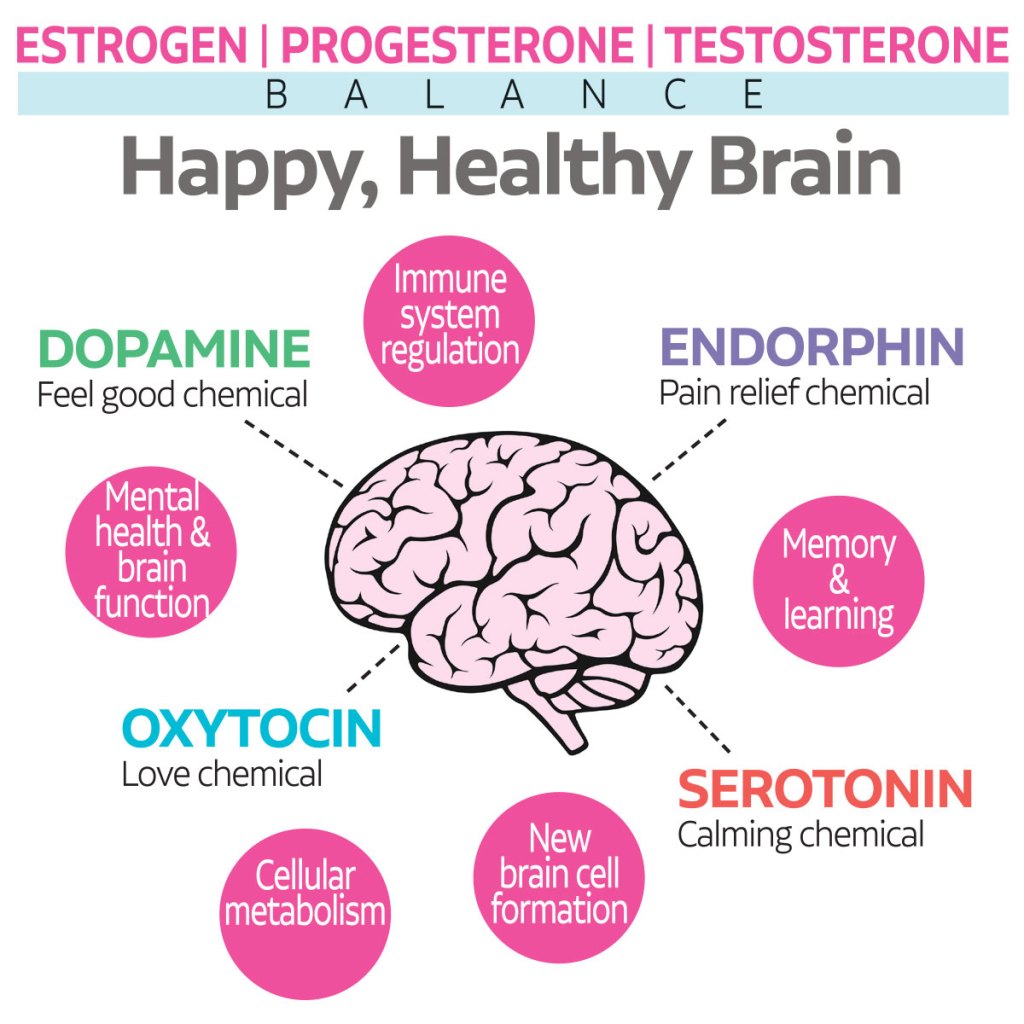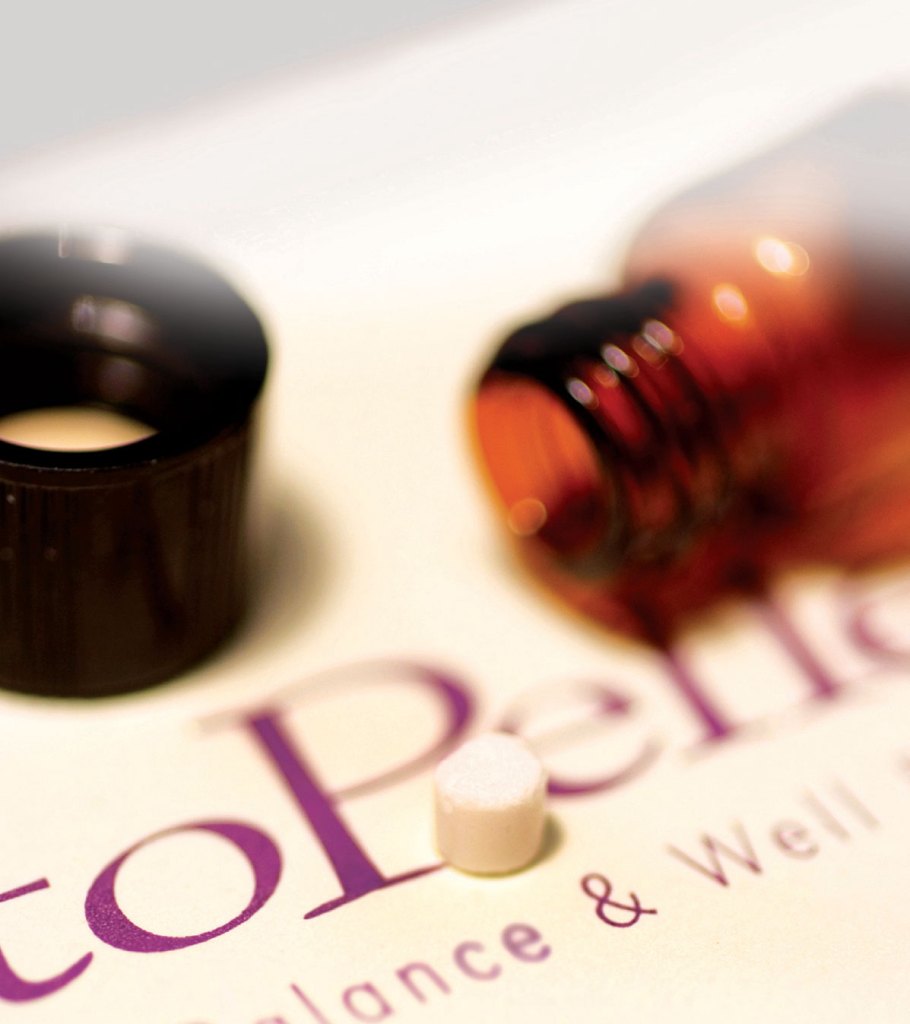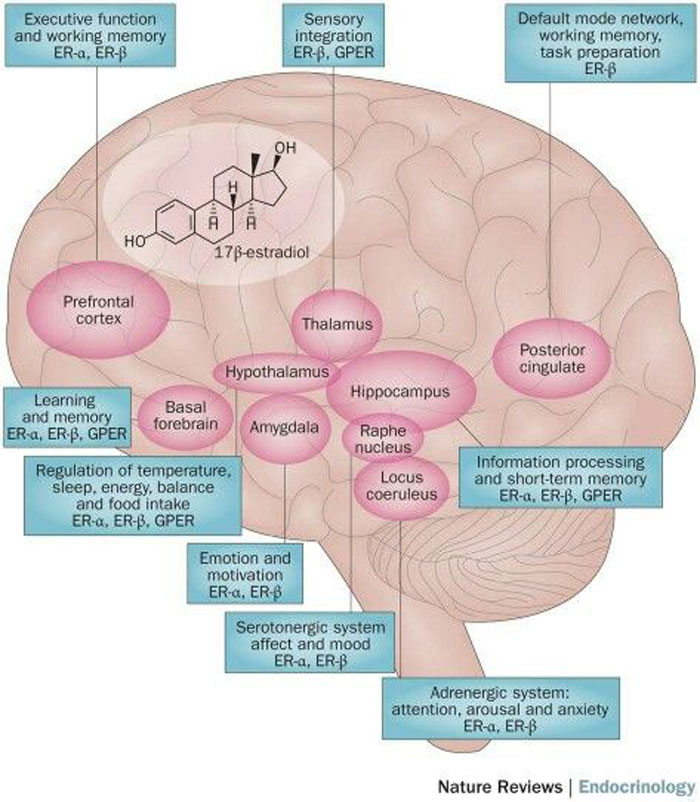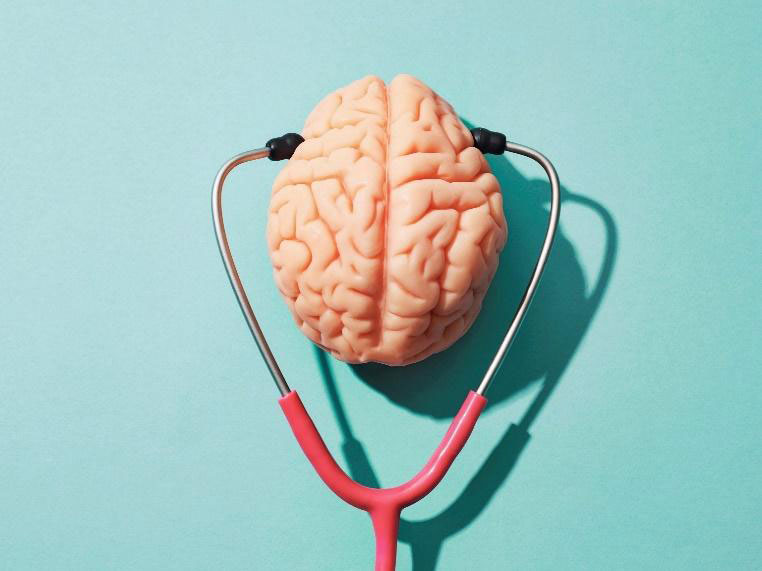Harmonize Your Hormones for Health and Happiness
Give your body, brain and mood a boost with an MD’s natural approach.

Feeling frazzled, fatigued, funky and foggy-headed? Do you keep misplacing those car keys or spacing out names and numbers? Maybe you’re constantly down in the dumps.
As women age and experience menopause, they undergo dramatic changes in their bodies and brains, from memory loss, mood swings and insomnia to fluctuations in appetite, weight and stress.
The World Health Organization estimates that many of the 50 million women in the U.S. over age 51 face cognitive decline and related mental conditions such as Alzheimer’s, dementia and depression.
According to a 2023 Columbia University Irving Medical Center report, the spike in cognitive disorders for women over age 45 remains a growing health concern, with women representing 65 percent of Alzheimer’s patients.
The good news: there are steps you can take to cut your risk and stay happy and healthy at any age. And it starts with your hormones.
It’s all in your head: hormones and the brain
Several studies by neuroscientists over the past 30 years highlight the intricate link between hormones and brain function. Think of your hormones like a TV remote control in charge of your behavior, thoughts and emotions. If the buttons don’t work, neither will your main screen.
Additional research shows the brain contains thousands of receptors for estrogen, progesterone and testosterone, and women’s bodies naturally produce all three.

Sex hormones regulate brain functions. Illustration by Andrade Design, California/Andradedesign.com
These hormones regulate the release of “feel good” chemical messengers like serotonin, dopamine, oxytocin and endorphins that signal every brain cell to do its job. Often called “the happiness hormones,” they influence everything from your thoughts, focus and mobility to your sleep, appetite and emotions.
When hormone levels fluctuate, those feel-good brain chemicals can’t function properly, causing cognitive and mood disorders.
The Alzheimer’s Society notes that hormones may pose a key factor in treating the disease since it often surfaces during menopause. While it’s no secret that hormones serve a critical role in a healthy brain, some confusion persists around supplementing them when levels dip as we age.
As a result, many women receive psychiatric drugs for mood swings instead of proper screening to rule out possible hormonal imbalances. This simple step could alleviate menopausal woes without the troublesome side effects that often accompany antidepressants.
Now, as the aging demographic prompts researchers to explore more solutions for rising bouts of brain fog and the blues, bioidentical hormone therapy offers an option for millions of women struggling with these common menopausal symptoms.
A doctor’s discoveries
One visionary doctor already connected the dots decades ago, pioneering an effective approach for a happy, healthy body and brain, without any adverse reactions.
Widely recognized as a global leader in hormone therapy and menopause as a board-certified ob-gyn, Dr Gino Tutera MD began using bioidentical hormones in 1979 and learned about pellets in 1992.

Gino Tutera, MD, FACOG. Photo by King Lawrence Photographer/kinglawrence.com
While hormone pellets have been used since 1939 and are backed by 80 years of scientific studies, Dr. Tutera innovated a proprietary dosing method to treat hormone deficiencies.
His groundbreaking research found that the key to optimal mind and body health required the right type of hormone administered with the right delivery method in the right dose individualized for each patient.
In 2004, he started SottoPelle® with his wife CarolAnn as CEO, bringing a safe, effective, scientifically proven system of bioidentical hormone balance to the forefront and launching an industry used by many medical providers today.
The SottoPelle® Method supports body-and-brain health by maintaining proper hormonal balance through the use of bioidentical estrogen and testosterone pellets, in addition to micronized bioidentical progesterone.
According to Dr. Tutera, understanding the key differences between bioidentical and traditional hormones can make all the difference in your health – and help resolve the confusion preventing women from making safe choices to protect their health.
HRT and BHRT: What’s the difference?
In his book “You Don’t Have To Live with It!”, Dr. Tutera explains the different types of hormones and the Science of SottoPelle®. Here’s how it works.
Traditional Hormone Replacement Therapy (HRT) uses synthetic-based pharmaceutical hormones in the form of pills, patches, creams and gels. Because they pass through the liver and their molecular structures don’t match the human body, they include a higher risk of harmful side effects.
Bioidentical Hormone Replacement Therapy (BHRT) uses natural plant-based hormones derived from yams or soy with a molecular structure that matches human hormones. Administered in the form a pellet, BHRT provides sustained hormone delivery without the potential side effects of HRT.
Numerous studies mention how BHRT pellets support brain health due to their sustained delivery method. But what is it and how does it work?
The Power of the Pellet®

Bioidentical hormone pellet. Photo by King Lawrence Photographer/kinglawrence.com
Pellets pack a punch for your health and vitality, with a consistent flow of bioidentical hormones delivered in the right amount at the right time.
About the size of a grain of rice, pellets are slipped painlessly under the skin. Unlike oral and transdermal forms of HRT that produce roller-coaster hormone surges, BHRT pellets provide sustained hormone levels throughout the day, for 4 to 6 months, without any side effects.
Pellets have become known as the safest and most effective form of hormone replacement available, according to a comprehensive study analyzing the efficacy of BHRT versus HRT .
BHRT pellets act like a “first-responder” or Navy SEAL for your health, a big burly lifeguard on 24-7 duty overseeing your physical and mental well-being, while HRT is like a part-time sentinel that often dozes off.
Dr. Tutera explains that pellet therapy is “the only effective delivery method because it bypasses the liver and provides a steady flow in the right amount exactly as needed.” This becomes critical for hormone brain-receptor function to restore normal physiology.
Estrogen: the “master switch” for brainpower
In his research, Dr. Tutera observed that estrogen serves as the “master switch” for 6 major areas of the brain with hundreds of estrogen receptors controlling a vast array of brain functions.
Estrogen, he explains, acts like a turbocharge, energizing neurons and boosting the neurotransmitters into motion. It’s like biting into an energy bar for your brain.

Estrogen regulates six major parts of the brain. Image courtesy of Springer Nature Reviews/Endocrinology, doi.org/10.1038/nrendo.2015.82..
Neuroscientists are now acknowledging what Dr. Tutera discovered decades ago: the role estrogen plays in cognitive function
One new study, “Estrogen Could be the Key to Women’s Brain Health,” by the American Academy of Neurology states: “Previous research has shown that rates of cerebrovascular disease increase after menopause, which is often attributed to the absence of hormones.”
Dr. Tutera urges women to check their hormone levels in their 40s, before the onset of menopause.
Testosterone – not just for men
According to Dr. Tutera, “Studies from 30 years ago proved that, around age 40, most women have lost normal levels of estrogen and nearly all their progesterone and more than half of their testosterone.”
Women’s need for all three hormones, he says, represents a major missing factor in protecting their health during menopause.
Dr. Tutera points to a 2008 Harvard Health report, “Testosterone, Aging, and the Mind,” as an example that applies to women but completely excludes them. Testosterone, he explains, supports women’s bones, brains, breasts and hearts while reducing body fat, cholesterol and even depression.
His 10-year breast cancer study published in 2014 and other studies show that bioidentical testosterone pellets prevented the development of breast cancer cells in thousands of women
Subsequent studies in 2011 and 2019 supporting the beneficial role of testosterone in women’s health substantiate Dr. Tutera’s earlier findings, claiming its critical role during menopause when they face higher risk for neurodegenerative disorders.
Unhappy hormones: dementia, depression and Alzheimer’s
Around 15 years ago, while using pellets to treat menopause and andropause, Dr. Tutera observed his patients reporting significant cognitive and mental health improvements.
That’s when he realized the neuroprotective benefits of BHRT and began helping patients with Alzheimer’s, Parkinson’s, dementia, depression, concussions and Traumatic Brain Injury.
His remarkable results were published in a major health journal in 2015, which stated: “Dr. Tutera has shown that these symptoms can be treated and possibly reversed with sex hormones, and the same hormones have been shown to reduce the risk of neurodegenerative diseases such as Alzheimer’s.”
Experts still remain skeptical of BHRT even though the latest research shows cognitive disorders continue to climb among menopausal women at alarming rates, Another recent 2023 study found that women using oral HRT developed a higher risk of hypertension.
Neuroscientists are now starting to link the synapses on what Dr. Tutera discovered years ago: the inextricable link between hormones and brain function. In 2007, as a medical pioneer ahead of his time, Dr. Tutera concluded: “Hormonal imbalance contributes to 90 percent of depression and mental illnesses.”

Copyright-free stock image, wallpapers.com
It’s a balancing act
Despite this existing data, researchers continue to ignore the facts about BHRT pellets. Why does so much confusion about hormones and women’s health persist?
Dr. Tutera explains that most studies fail to distinguish between the two different types of hormones – synthetic and bioidentical – and delivery methods. Both hormones got a bad rap, he says, after the 1991 Women’s Health Initiative reported serious health risks from the use of synthetic HRT on postmenopausal women.
However, he points to the study’s blind spot: researchers failed to mention that those risks didn’t apply to natural BHRT.
Now, over 25 years later, the latest studies continue to focus solely on synthetic HRT, ignoring natural BHRT and any mention of the pellet method that’s been used successfully for 85 years.
According to Dr. Tutera, this is the elephant in the room of women’s health that nobody’s talking about.
Armed with this medical wisdom that’s nearly a century old, he urges women to take back their health and happiness instead of falling into the rabbit hole of debilitating neurodegenerative diseases that could be prevented by harmonizing their hormones
Life Regained: Focusing on the Future
Marking its 30th year as the founder of individually dosed bioidentical pellets, SottoPelle® continues Dr. Tutera’s trailblazing legacy.
Understanding the pivotal role hormones play in their health can help women age gracefully and enjoy better quality of life. After all, good health is happiness.
Start with a free online assessment to check your symptoms for hormonal imbalances or visit www.sottopelletherapy.com online for more information.
This content is not a substitute for professional medical advice or diagnosis. Always consult your physician before pursuing any treatment plan.
Image credits:
Dr. Gino Tutera and pellet photos by King Lawrence Photographer/kinglawrence.com
“Happy, Healthy Brain” Illustration by Andrade Design, California/Andradedesign.com
Estrogen Brain Receptors illustration with permission from Springer Nature Reviews/Endocrinology, doi.org/10.1038/nrendo.2015.82.
Brain with stethoscope, copyright-free stock art, wallpapers.com
Written in partnership with Catherine J. Rourke
Members of the editorial and news staff of Woman's World were not involved in the creation of this content.













